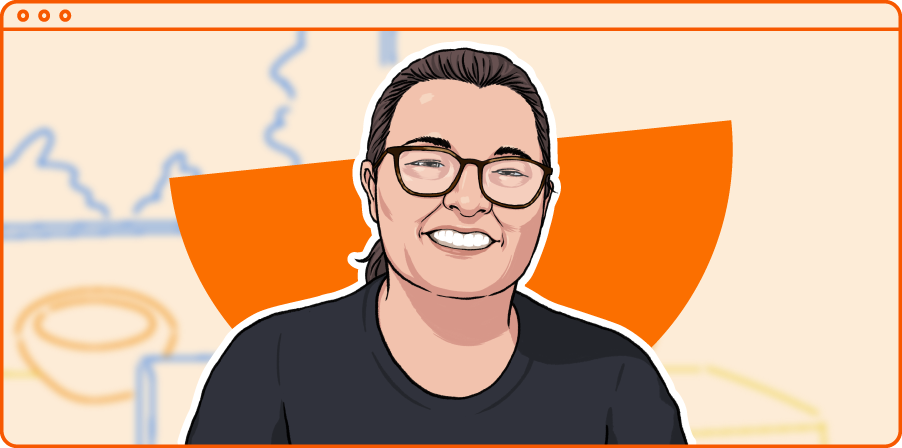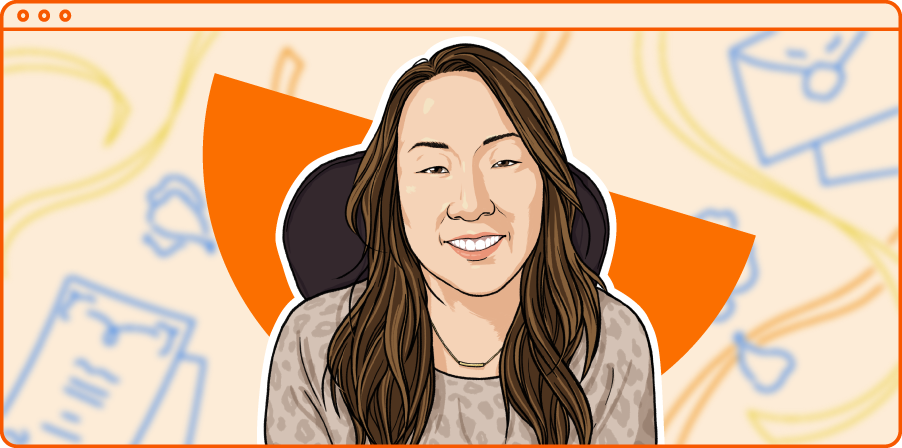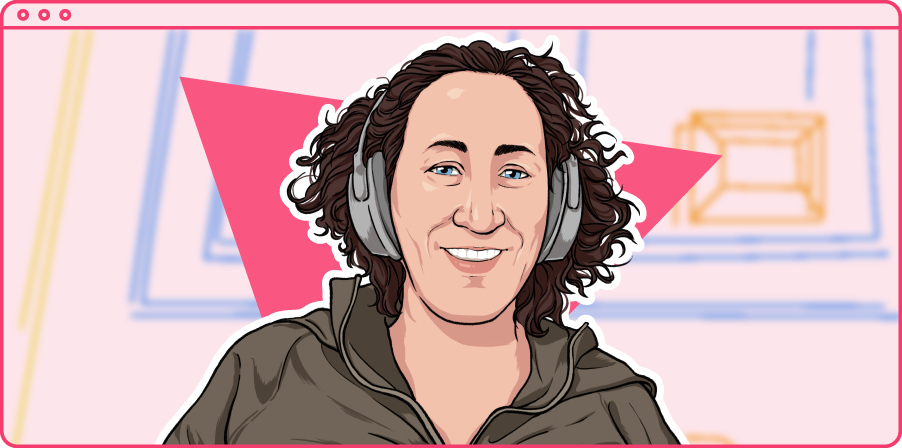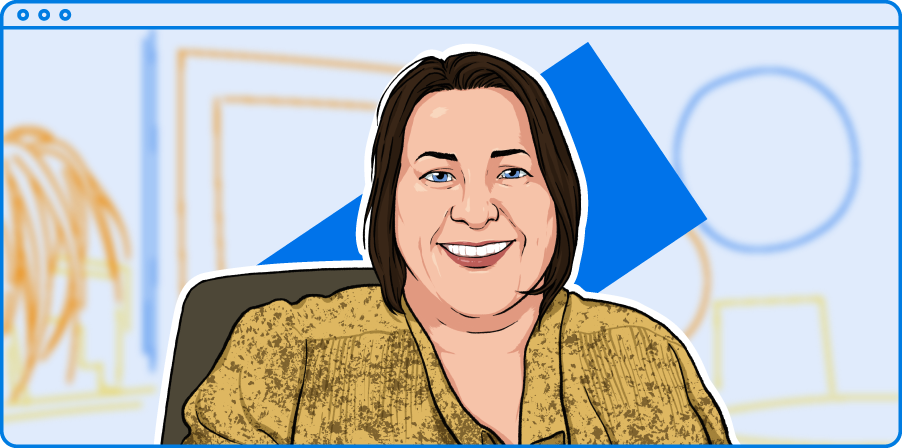Briana Sim is a BC-based entrepreneur. In 2014, Briana co-founded Radical I/O Technology, a firm that does custom software development. In August of 2022, she officially launched her second venture, SimpliCity. SimpliCity offers software solutions to help Canadian municipalities improve delivery of public services and reach their digital transformation goals faster. Briana runs both businesses with her spouse Ian.
In this, Briana talks about the lessons from her first business she will apply to her second, and why she finds changemaking easier as a business owner.
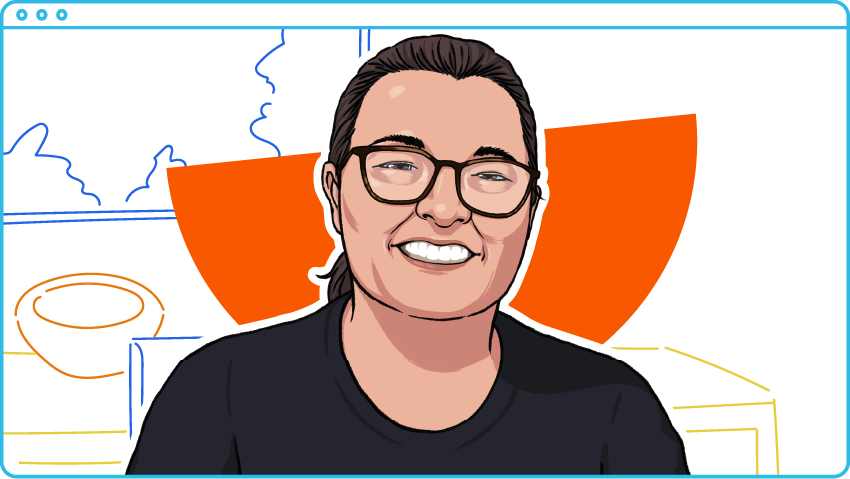
Workomics: Let’s go back to before Radical started. What was going on in your life at the time, and what made you think, “We’re going to do this.”
Briana Sim: At that time, I was in my late-30s, and thinking about my 40s. Is this what I want in the next stage of life? I’d been working in higher education — I really love that space because I think education is the great equalizer of society. I’m also the type to get my whole identity and self-worth from my work. It’s all intertwined. In that higher education space, I felt disappointed that I couldn’t make the change that I wanted. And I realized that if I want things to change, I’m going to have to change my situation.
At the same time, my spouse Ian was freelancing and deciding to build a company. He was going to start looking for people he could trust to run the business side of things. I wanted to do something new, so I thought, “Why don’t I help you with this for now, and it will help me figure out what I really want to do from there.”
In the beginning I was nervous. Project management and IT? Clients are going to think I’m an imposter. Then as I got more and more into running the business, I realized it’s not his company. It’s our company. I have just as much say and impact. I was just astounded by all the unknowns I could tackle and deal with. My confidence and skillset grew through those early years of Radical, because I had the chance to shape my workday, shape our people and culture, and shape our strategy.
WKO: Tell me more about starting a company with your spouse. That’s one basket that you’re putting all your eggs in.
BS: [Laughter] Yep. Our family thought we were crazy—that we were going to be at each other’s throats 24-7, that our marriage was going to break up. That never happened. But over the years as our company has grown, and as more employees joined, work has been a 24-7 thing for us. We have to be really intentional about taking a break: “This walk is us-time and there’s no work talk at all.”
The one benefit that we come back to is we could always 100% trust each other. We could communicate with each other. We really respect each other’s skillsets. And we knew that we were each giving our all and we never questioned that. I think that’s invaluable when starting a business. It’s a whirlwind of unknowns and stressors, so a true partnership that we could rely on was instrumental.
WKO: Especially when you’re a small company, the degree to which your fortunes are tied together is quite remarkable.
BS: There’s huge risk and huge pressure. At the beginning it was more of an exciting risk and a calculated risk because if it didn’t work out, we could go back to working for others. As the years go on and you’re building up capital—in all its forms— you have more to lose than at the beginning.
It’s hard to separate it all. I also used to think, as a woman entrepreneur, it was almost like I wasn’t legitimate because I was going into this with my spouse —that I needed my (male) spouse to run a business. I felt sometimes like I’m not a true entrepreneur because I’m not doing it on my own. That’s not true, but I’ve had to work through that. It’s just another form of partnership, and you’re lucky to have people you trust, and you can’t do it all on your own.
WKO: How has Radical changed from what you were envisioning back in 2014? What has that trajectory been like?
BS: Radical initially provided custom software development services. We did it all — end-to-end, every technology. I think a lot of services start the way we did: without a plan. We didn’t do marketing, or narrow down to a specific type of customer. Our only goals at that time were to do things with high quality and integrity, to not have a toxic, masculine, “tech-bro” work culture, to provide excellent customer service, to try to find a way to make a name for ourselves.
In the beginning, we were developing software with some credit unions — always very integration-focused, rather than developing the interfaces customers see. Not everybody likes dealing with the unsexy behind-the-scenes stuff, so we had more enterprise-type customers even though we were quite small. Over the years we grew to support the projects we were working on.
Long-term, services wasn’t what we wanted to do. We always wanted to build digital products that we could form an identity around. I naïvely thought that while projects were happening, we could also work on those products at the same time and move our strategy forward. That never really happened — we were going after any and all opportunities, without a focused strategy.
Of course, SimpliCity and working with cities eventually came out of our trial and error, so we did something right along the way.
WKO: Let’s talk about SimpliCity and the decision to spin it out and create its own entity. How did you know that this was the product and this was the time?
BS: In 2017, we had won a large competitive RFP with the City of Richmond to build out their “MyRichmond” customer self-service web portal and integrations. That really put us into the problem space of government and municipalities and allowed us to learn a lot. They are great partners: very collaborative, giving good feedback, and educating us in certain ways. Once we had been working in the space for four or five years and had a few other municipal customers, I saw a need in the market. It wasn’t like with Radical, where we started out not understanding the landscape. This time, we had years of understanding and research and hearing repeated themes. After Covid, like everybody else, our business got shook up a bit, so it felt like the right time to pivot and focus on what we really wanted to do. SimpliCity made sense for our values and for the type of problem we were excited to try to solve.
WKO: Is there more of a master plan with SimpliCity?
BS: There is more of a plan with SimpliCity, but until multiple customers buy it, those plans could go out the window. I will always incorporate priorities from customers to help shape it. But it is different from Radical, because there are specific things I’m working towards.
WKO: You’re still doing both Radical and SimpliCity at this moment. How are you keeping the client projects from eating up all your time?
BS: They do eat up all the time! I would say I’m working two-to-three jobs. We are on another large project with the City of Richmond, which is sizable in terms of effort, focus, and timelines. I’m the project manager on that project; I’m trying to make SimpliCity more visible and finalize partnering with our first customer; and I’m trying to work on my strategy for the product itself.
I need to be purposeful: these two afternoons are on SimpliCity, these other ones are on the City of Richmond project. We’ll see how it all works out. It’s difficult. My goal by the end of summer would be to have most of my full-time focus being on SimpliCity. I tell myself it’s only for a few more months.
WKO: One of the things you emphasize is how important it is for Radical to be a people-first technology consultancy. I’m wondering if you could speak more to how you’re hoping to translate that ethos into SimpliCity.
BS: If you’re just doing something because it sounds cool—which happens a lot in tech—it’s a very empty feeling. For SimpliCity, digital transformation isn’t just done at the technology level. It’s transformation of the municipality’s culture, how the public interacts with cities, how you make things better and more efficient for employees, and how those employees are motivated because they can see they’re actually making a difference with the public they serve. I think that people working in the municipal space got into it because they believed in what they were doing and wanted to make a positive impact. Sometimes that gets lost along the way, but we want to bring back that excitement for a two-way conversation and foster relationships with the public, not just be cool tech.

WKO: Talk about some of the most salient lessons you’re going to try to pull through from Radical to SimpliCity.
BS: With Radical, we were always optimistic for the future, so I’d say we grew faster than what our reality should have had us do. It’s good to have that in a way —you’re always looking forward. But we didn’t pay ourselves for many years in Radical. There was a dividend here and there, but it hid how profitable we really were, even from ourselves.
In the last six months of 2019, a bit before COVID, some agencies in our space were closing. We also had to downsize and lay off a lot of our team towards the end of that year. It was the hardest thing I have ever had to do, but it was because we kept looking to the future instead of seeing the reality of the present. Then three big contracts we were counting on didn’t happen. We don’t have outside investment; everything is based on customer revenue. We had given the team a heads-up a few months prior that if we don’t have an additional project come in, we might have to do the unthinkable. Even just getting to that point of a heads-up was crushing for me. Everyone was so close on the team.
I do not want a repeat of that. I want to be very realistic about what is currently happening and what I can afford now. For SimpliCity, I’m not hiring a permanent team until I know I have the customers and the cash flow to support that longer term. I’m very upfront about that in the interview process for new hires. Customers spend money on your service or your product and that’s how you fund growth. If the customers aren’t there, you can’t fund your growth, and maybe you need to rethink what you’re doing.
WKO: I’m curious about definitions of success. If I’d asked you in 2014, “what does success look like,” what was the answer then, and how has it changed between then and now?
BS: Success in 2014 would have been: we can hire a permanent team; we have customers; we’re profitable; we could make a real living out of this. The other part was: are we making an impact? Are we working with purpose? Are we known for high-quality work? Do people like working with us on the team and as customers? More of that feeling that you get working day-to-day or week-by-week. Those were my definitions of success.
I feel like we’ve had moments of those successes through the years. But success is always a moving goalpost. Even if you reach a milestone, what are you doing if you just stagnate? I’m always striving for the next challenge, and the definition of success will always keep growing.
For SimpliCity, we consider all the same things to be success. But the goal is also to scale to a point where there’s repeatable processes and values in place, so that trusted, skilled people can come in and run the business day-to-day. I will always have a hand in it, but I want to get to a point where I can do my part of the business from anywhere in the world. I have to think about whether I want an exit at some point. As a tech entrepreneur I’m supposed to say, “This is the exit; this is who I want to sell it to; this is the money I want to make, and then I want to do another business and another business.” I’m not quite there yet, because I don’t know what the future holds.
I just want to do good work and I want to know that I’ve made some sort of positive impact. I don’t have kids, so my impact is in my business — in what I do and how I show up for people. That’s fulfillment for me.
WKO: Do you think that that kind of fulfillment is obtainable in a more traditional employment setup, or is it something that’s unique to business ownership?
BS: I think it’s so much harder to do in paid employment, because you don’t have autonomy to make the changes that you want to make. You always have to send it up the chain and you’re often shot down. The more that happens in your career, the less you suggest change and improvement, because it falls on deaf ears.
WKO: That’s quite profound — the notion that suggestions and initiative for change cumulatively falls on deaf ears over years until it just kind of withers. Do you think gender plays a role there?
BS: Gender plays a role in everything. [Laughter]. I’ll generalize, but culturally, women are supposed to play within the rules, aren’t supposed to kick up a fuss, are supposed to do what they’re told. Whereas men — again, to generalize —seem to have this freedom to buck the trends, go outside of the lines, take a stand. All these characteristics are celebrated in men and not in women generally.
Women self-censor ourselves so much. If you’re rewarded for a certain type of behaviour, you continue that behaviour. If you’re not, you will shut that behaviour down. That’s in work. That’s in life. That’s anywhere.
WKO: In that sense, business ownership can be a mechanism to have more control over that incentive structure.
BS: Yes! I get to experiment and play with everything. If I fail, then at least I tried. When you own a business, you’re taking the power for yourself; nobody else empowers you. It’s a great feeling and it’s my favourite part of running a business: the autonomy, the decision making, the challenge, the risk, the everything-is-on-me. I love that. I’ve always been honest; I’ve always pushed things. But now it’s all in alignment.
I’m excited about the future. I’m excited to take what I’ve learned and the skills I’ve built and turn SimpliCity into power for good. I think that excitement is why entrepreneurship is quite in-line with who I am.
Our other ideas worth exploring
A business in transition
Rebecca Chan, owner and creative director of Rebecca Chan Events, talks about transitioning her business from weddings to corporate marketing.
Investing for long-term sustainability
Joelle Faulkner, CEO and Founder of Area One Farms, talks about building up her own investment firm, focusing on Canadian agriculture.
Fostering connection, community, and care
Jill Curran, owner of two tourism-based businesses, talks about building layers of care and community into clients’ travel experiences.

